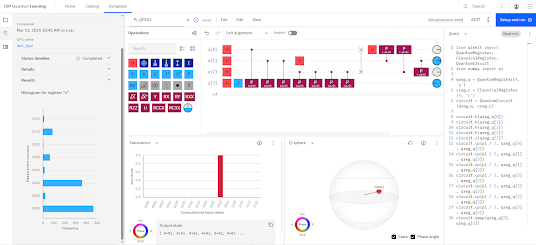Nowadays, Quantum Computing is currently becoming of the most disruptive technologies due its potential to solve complex problems exponentially faster than classical computers, what makes it an increasingly important field.
Qubit: In quantum computing, the qubit (or quantum bit) is the basic unit of information, serving a function similar to that of the bit in classical computing. However, unlike a classical bit, which can only be in one of two states: 0 or 1, a qubit can exist in a superposition of its two ground states, commonly denoted as |0⟩ and |1⟩. This superposition means that the qubit is, in a certain abstract sense, "between" the two ground states. Note that when a qubit is measured in the standard basis, the result is a classical bit.
Superposition: In the context of quantum computing, superposition refers to the ability of a quantum system, such as a qubit, to exist in a linear combination of multiple states simultaneously until a measurement is made, at which point the system collapses to one of those states with a certain probability. This means that a quantum computer can process a vast amount of information in parallel, enabling much faster calculations for certain problems.
Quantum Entanglement: This is a fundamental concept within the field of quantum information. Essentially, it describes the situation in which two or more quantum systems are correlated in a way that cannot be described by individual states, even when the systems are spatially separated. The properties of these entangled systems are intrinsically linked, such that the state of one instantaneously influences the state of the other, regardless of the distance between them. This property is key to the speed and security of quantum computing.
Decoherence: Decoherence is the loss of a quantum state in a qubit. Environmental factors, such as radiation, can cause the quantum state of qubits to collapse. A major engineering challenge in building a quantum computer is designing the various features that attempt to delay the decoherence of the state, such as building special structures that shield the qubits from external fields.
Quantum Gates: They are the fundamental building blocks of quantum circuits. Just as classical logic gates operate on bits, quantum gates act on qubits, allowing the execution of basic operations that manipulate those qubits, as well as the construction of quantum circuits that implement quantum algorithms. They are analogous to classical logic gates but operate under the principles of quantum mechanics. Unlike classical logic gates, quantum gates enable transformations of superposition states and entangle qubits to perform advanced computations.
Quantum Error Correction (QEC): Due to the fragile nature of quantum states, quantum systems are inherently fragile and susceptible to interactions with the environment, which can lead to errors that potentially compromise the viability of large-scale quantum computations. QEC algorithms are crucial for ensuring the reliability of large-scale quantum computation by mitigating the fragility of quantum states in the presence of noise and decoherence. This can be done by implementing redundancy in the encoding of quantum information and executing correction operations. QEC is a pivotal instrument that empowers scientists and engineers to construct precise and dependable quantum computers, ensuring more accurate and stable computations.
These six concepts are fundamental to understanding the power and challenges of quantum computing. As this technology advances, its impact increases significantly on fields such as cryptography, optimization, and artificial intelligence.
Suggested readings:
What Is Quantum Computing? - IBM https://www.ibm.com/think/topics/quantum-computing
Quantum Computing: Key Concepts, Developments, and Challenges - Argano https://argano.com/insights/articles/quantum-computing-key-concepts-developments-and-challenges.html
Quantum Computing Basics: A Beginner's Guide - BlueQubit https://www.bluequbit.io/quantum-computing-basics
Quantum Computing Technology: Understanding the Basics | NYIT https://online.nyit.edu/blog/quantum-computing-technology-understanding-the-basics
What is Quantum Computing? - AWS https://aws.amazon.com/what-is/quantum-computing/

No hay comentarios.:
Publicar un comentario